GREETINGS FROM THE INDUSTRIAL/ORGANIZATIONAL PSYCHOLOGY PROGRAM
AT COLORADO STATE UNIVERSITY
SPRING 2022
We hope this newsletter finds you healthy and well! We are pleased to share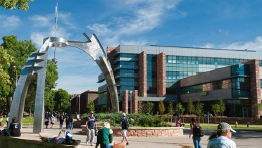 our spring newsletter with you to tell you a bit about what is happening in our program. First, we want to express our tremendous gratitude to Dr. Kevin Murphy for ongoing work with teaching courses in our program and our department. For the past few years, Kevin has been teaching the first-years statistics course sequence for psychology graduate students. He has also been teaching Multivariate Statistics and this spring is teaching the I-O Weekly Seminar. At the end of each weekly seminar class, he has a segment called “Story Time” in which he recounts some of the particularly notable or memorable experiences he has had during his career. For those of you who attended Colorado State during Kevin’s tenure in the program or have worked with Kevin and you have stories you would like to share, we would love to hear them!
our spring newsletter with you to tell you a bit about what is happening in our program. First, we want to express our tremendous gratitude to Dr. Kevin Murphy for ongoing work with teaching courses in our program and our department. For the past few years, Kevin has been teaching the first-years statistics course sequence for psychology graduate students. He has also been teaching Multivariate Statistics and this spring is teaching the I-O Weekly Seminar. At the end of each weekly seminar class, he has a segment called “Story Time” in which he recounts some of the particularly notable or memorable experiences he has had during his career. For those of you who attended Colorado State during Kevin’s tenure in the program or have worked with Kevin and you have stories you would like to share, we would love to hear them!
A few years ago, the I-O psychology program established small grant awards to support graduate student research within the CSU I-O psychology program. The Kraiger Research Award, named in honor of Dr. Kurt Kraiger (Professor at CSU from 2005-2018), provides up to $1,500 per project. Students compete for these awards by writing a grant proposal and winners are selected by the I-O faculty. Recipients of the Kraiger Research Award this year include Annika Benson (Fall, 2021) and Marisa Rosen and Rachel Perpich (Spring, 2022). More information about these students’ research is provided later in the newsletter.
Every year, we present the George C. Thornton III Graduate Student of the Year award to recognize a student with outstanding accomplishments in the science and practice of I-O Psychology. The 2021 recipient of this award was Jacqueline (Jacq) Wong (5th year) for her exemplary work.
We are incredibly proud of the outstanding work that our faculty and students have been doing. Please read on for more information about these projects and a list of what will be presented at SIOP in Seattle!
Cordially,
Gwenith G. Fisher
Associate Professor & I-O Psychology Program Coordinator.
See us at SIOP
We are excited to see many of you at the annual SIOP conference this year! We 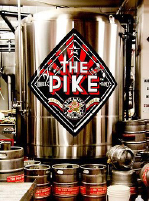 are pleased to host an in-person gathering on Thursday evening, April 28 from 8-10pm at the Pike Brewery. We hope you will be able to join us!
are pleased to host an in-person gathering on Thursday evening, April 28 from 8-10pm at the Pike Brewery. We hope you will be able to join us!
When: Thursday, April 28th, 8:00 –10:00pm
Where: Pike Brewery,
1415 First Avenue, Seattle, WA 98101 https://www.pikebrewing.com/
Food will be provided; cash bar will be available
SIOP Presentations
Our students have been working hard and had many presentations accepted. In fact, Colin Willis (Alumni, 2019), Tracy Powell-Rudy (Integrate), Kelsie Colley (6th year), and Josh Prasad submitted a poster, “Examining the use of game-based assessments for hiring autistic job seekers,” which was selected as one of the top 1.7% of all posters and awarded as Top Ten Poster for SIOP 2022. Additionally this work is a finalist in the Association for Business Psychology Awards for Excellence in Inclusive Assessment Experiences.
Be sure to stop by this poster and our other students’ work this year! Our students love to talk about what they’ve been up to and look forward to meeting you!
Hannah Finch (3rd year), Josh Prasad, Annika Benson (2nd year), Brittany  Lynner (2nd year), and Kelsie Colley (6th year), Symposium: Dangerous Interests: Predicting Safety using Vocational Interests
Lynner (2nd year), and Kelsie Colley (6th year), Symposium: Dangerous Interests: Predicting Safety using Vocational Interests
Julia Beckel and Gwen Fisher, Symposium. Telework and Implication for Managing Demands between Work and Family
Kidwell, K.E. (Chair), French, K.A. (Co-chair), & Wiese, C.W. (Co-chair), Campbell, C., Carter, N., Rebecca Clancy (5th year), Harrison, E., and Kurt Kraiger, Panel: Is it Imposter Syndrome? Navigating Grad Student Mental Health and Neurodivergence
Ahmad, A. (Co-Chair), Julia Beckel, (3rd year) (Panelist), Bui, T. (Panelist), Flores, C.(Panelist), Iverson, J.L. (Non-speaking contributor), Jones, T. (Panelist), Praslova, L. (Panelist), Ullah, H. (Co-Chair), Panel: Thinking Virtually: Well-being, Challenges, Opportunities, and Everything in Between Faced by Underrepresented Minorities
Rosalyn Stoa (2nd year), Rebecca Clancy (5th year), Rachel Perpich (2nd year), Gwen Fisher, Poster: “Nibbled to Death by Ducks:” Expanding the Content of the Faculty Stress Index.
Marisa Rosen (5th year) and Danni Gardner, Poster: In this Economy? Voice Behaviors and Silence under Economic Crisis.
Danni Gardner and Josh Prasad, Symposium: The consequences of being myself: Understanding authenticity, disclosure, and psychological safety for LGB workers.
Nye, C. D. and Danni Gardner, Symposium: Examining moderator effects on the relationship between interests and satisfaction.
Danni Gardner and Ryan, A. M., Poster: Comparing boundary management congruence in heterosexual and LGB employees.
Alanis, J. M., Danni Gardner, and Nye, C. D., Poster: Explaining the gender pay gap through vocational interest fit.
Josh Prasad, Symposium: Exploring the utility of machine learning through diverse applications.
Josh Prasad, Somaraju, A., Nye, C. D., and Sun, T., Paper presentation: Clarifying the Utility of Machine Learning: A Simulation Study.
CSU I/O Program Publications
Check out some of our recent publications!
*denotes CSU Alumni
Parker, S.K., Ward, M.K., & Fisher, G.G. (2021). Can High-Quality Jobs Help Adults Learn New Tricks? A Multi-Disciplinary Review of Work Design for Cognition. Academy of Management Annals, 15(2), 406-454. https://doi.org/10.5465/annals.2019.0057
Parker, S. K. & Fisher, G. G. (March 2, 2022). How well-designed work makes us smart-er. MIT Sloan Management Review. https://sloanreview.mit.edu/article/how-well-designed-work-makes-us-smarter/
Nye, C. D., Prasad, J., & Rounds, J. (2021). The effects of vocational interests on motivation, satisfaction, and academic performance: Test of a mediated model. Journal of Vocational Behavior, 127, 103583. https://doi.org/10.1016/j.jvb.2021.103583
Gardner, D. M., Briggs, C. Q., & Ryan, A. M. (In press). It is your fault:
Workplace consequences of anti-Asian stigma during the COVID-19 pandemic. Equality, Diversity and Inclusion: An International Journal. doi: 10.1108/EDI-08-2020-0252
https://www.emerald.com/insight/content/doi/10.1108/EDI-08-2020-0252/full/html
Beckel, J. L. O. & Fisher, G. G. (2022). Telework and worker health and well-being: A review and recommendations for research and practice. International Journal of Environmental Research and Public Health, 19, 3879.
https://doi.org/10.3390/ijerph19073879
Beckel, J. L. O., Gardner, D. M., Prasad, J. J. (2022). Decolonizing intervention assessment: Qualitative and interdisciplinary approaches to understanding “side effects.” Industrial and Organizational Psychology, 15(1), 113-116.
Perpich, R. A., Brossoit, R. M.*, Fisher, G. G., Kath, L. M., & Kunz, J. (In Press). Going upstream: Recommendations for training the next generation of I-O influencers. Industrial and Organizational Psychology: Perspectives on Science and Practice.
Lynner, B. N., & Finch, H. M. (In Press). Beyond learning outcomes: Creating equitable learning environments in online I-O graduate education. Industrial and Organizational Psychology: Perspectives on Science and Practice.
Wong, J. R., Crain, T. L., Brossoit, R. M.*, Hammer, L. B., Bodner, T. E., & Brady, J. M. (in press). Beyond just resilience: The important role of work-family resources for military service members. Occupational Health Science.
Brossoit, R. M*., Wong, J. R., & Fisher, G. G. (2021). Same degrees, different requirements: The variety of comprehensive requirements (“comps”) in I-O psychology master’s and doctoral programs. The Indus-trial-Organizational Psychologist.
Carr, D., Helppie-McFall, J., Beckel, J. L. O., Carpenter, R. (2021). Creating a public data re-source: The HRS-O*NET Linkage. Innovations in Aging, 5(Suppl. 1), 231-231.
Jaramillo, D., Krisher, L., Schwatka, N. V., Tenney, L., Fisher, G. G., Clancy, R. L., … Newman, L. S. (2021). International Total Worker Health®: Applicability to agribusiness in Latin America. International Journal of Environmental Research and Public Health, 18(5), 2252.
https://doi.org/10.3390/ijerph18052252
Johnsen, L., Stoa, R., & Fogaca, J. (2022). To be or not to be paid? Examining the effects of scholarship removal on NCAA swimmers. Inter-national Journal of Sports Psych. Advance Online Publication.
Robles-Saenz, F., Brossoit, R.M.*, Crain, T.L., Hammer, L.B., & Wong, J. R. (2021). Under-standing the role of family-specific resources for immigrant workers. Occupational Health Science.
https://doi.org/10.1007/s41542-021-00099-0
Thomas, C. L., Murphy, L. D., Mills, M. J., Zhang, J., Fisher, G. G., & Clancy, R. L. (2021). Employee lactation: A review and recommendations for research, practice, and policy. Human Resource Management Review, https://oi/10.1016/j.hrmr.2021.100848
Willis, C.*, Powell-Rudy, T., Colley, K., & Prasad, J. (2021). “Examining the use of game-based assessments for hiring autistic job seekers. Journal of Intelligence 9(4)
https://doi.org/10.3390/jintelligence9040053
Fisher, G. G., Barnes-Farrell, J. L., Beckel, J. L., & Shultz, K. (2021). Using archival data to re-search age and work. In. H. Zacher & C. Rudolph, Age and Work: Advances in Theory, Methods and Practice. SIOP Organizational Frontiers Series. New York, NY: Routledge.
Student Presentations
In addition to SIOP, our students presented their work at various conferences this year
Beckel, J.L.O. (October, 2021). Managing Telework for Total Worker Health [Webinar Session]. Health Links: Annual Conference.
Beckel, J.L.O., Fisher, G.G., Prasad, J., McGonagle, A. Stallones, L., & Rosecrance, J. (October, 2021). Telework, work ability, and well-being among workers with chronic health conditions [Poster Presentation].
PA/NIOSH/SOHP Work Stress & Health Conference. Virtual.
Beckel, J.L.O., Kunz, J.J., Prasad, J.J., Finch, H.M., Kaldahl, K.M.* (October, 2021) The impact of telework on conflict between work and family: A meta-analytic investigation [Poster Presentation]. APA/NIOSH/SOHP Work Stress & Health Conference Virtual.
Clancy, R. L. & Fisher, G. G. (2021). Occupational Stress and Mental Health Among Faculty in Academia: Hidden Costs of Success? Virtual poster presentation at the Mountains and Plains Education and Re-search Center’s (MAP ERC) 12th Annual Re-search Day Symposium. April 8, 2021. Denver, CO/Virtual.
Finch, H. M. (April, 2022) Mental resources for achieving future plans: Trajectories of future self-continuity, stress, and counter-productive workplace behaviors in the workplace. Poster presentation at MAP ERC Research Day Symposium, Denver, CO.
Lynner, B., Prasad, J., Fisher, G. G., Brenner, R., & Shore, L. (2022, March). Hear no burn-out/speak no burnout: Supervisor perceptions of subordinate burnout. Research session presented at the American College Personnel Association (ACPA) Annual Conference, St. Louis, MO and MAP ERC Annual Research Day, Denver, CO.
Perpich, R. (April, 2022). Perceptions of supportive organizational practices and well-being outcomes for sexual minority employees. Post-er presentation at MAP ERC Annual Research Day Symposium, Denver, CO.
Stoa, R., Myers, S., & Fisher, G. G. (2022, January). Zoomed in or zoned out? Attitudes among students in an online vs hybrid research methods course. [Poster]. National Institute on the Teaching of Psychology, St. Pete Beach, FL
Stoa, R., Perpich, R., Martin, A., & Dyson, T. (2022, April). A face or façade? Comfort with emotional expressivity in the workplace measure. [Poster]. Rocky Mountain Psychological Association, Salt Lake City, UT, United States, and MAP ERC Annual Research Day, Denver, CO.
Student Milestones
 Brittany Lynner (2nd year) proposed her the-sis titled “Hear No Burn-out, See No Burnout, Speak No Burnout: Factors that Influence a Supervisor’s Ability to Accurately Perceive Subordinate Burnout.” Her research, which is funded by a NIOSH Mountain and Plains pilot project program grant, will examine burnout among college student affairs professionals given their unique job demands. Student affairs professionals’ expression of burnout may differ depending on their relationship with their supervisor. Thus, the central question of this study concerns how the relationship between supervisor and subordinate influences a supervisor’s ability to accurately perceive subordinate burnout. Expected factors to influence a supervisor’s ability to accurately perceive subordinate burnout include whether supervisor and subordinate see “eye to eye” in their perception of relationship quality, subordinate surface acting, subordinate self-interested voice, and subordinate racial identity.
Brittany Lynner (2nd year) proposed her the-sis titled “Hear No Burn-out, See No Burnout, Speak No Burnout: Factors that Influence a Supervisor’s Ability to Accurately Perceive Subordinate Burnout.” Her research, which is funded by a NIOSH Mountain and Plains pilot project program grant, will examine burnout among college student affairs professionals given their unique job demands. Student affairs professionals’ expression of burnout may differ depending on their relationship with their supervisor. Thus, the central question of this study concerns how the relationship between supervisor and subordinate influences a supervisor’s ability to accurately perceive subordinate burnout. Expected factors to influence a supervisor’s ability to accurately perceive subordinate burnout include whether supervisor and subordinate see “eye to eye” in their perception of relationship quality, subordinate surface acting, subordinate self-interested voice, and subordinate racial identity.
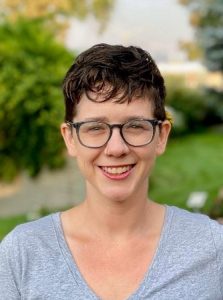 Julia Beckel (3rd year) defended her thesis, titled “Telework, Work Ability, and Well-being among Workers with Chronic Health Conditions.” She conducted a study using an experience sampling design to the indirect effect of teleworking on worker’s work ability and well-being via levels of job control and flexibility, while assessing the moderating role of the type of work activity performed while teleworking, such that some work activities allow for more job control and flexibility and subsequently higher levels of work ability and well-being. Results indicated workers with chronic health conditions reported higher levels of job control and flex-place perceptions when teleworking versus in-organization, and subsequently higher levels of work ability, life satisfaction, job satisfaction, and lower levels of depression. However, the type of work activity influenced the extent to which a worker experiences the beneficial effects of teleworking, such that workers engaged in high levels of educational tasks (i.e. online instruction) experience lower levels of job control, and subsequently lower levels of work-ability and well-being. Additionally those engaging in highly creative tasks (e.g., artistic out-put, design work) are hindered by their location (i.e., flex-place perceptions) and experience lower levels of work ability and well-being.
Julia Beckel (3rd year) defended her thesis, titled “Telework, Work Ability, and Well-being among Workers with Chronic Health Conditions.” She conducted a study using an experience sampling design to the indirect effect of teleworking on worker’s work ability and well-being via levels of job control and flexibility, while assessing the moderating role of the type of work activity performed while teleworking, such that some work activities allow for more job control and flexibility and subsequently higher levels of work ability and well-being. Results indicated workers with chronic health conditions reported higher levels of job control and flex-place perceptions when teleworking versus in-organization, and subsequently higher levels of work ability, life satisfaction, job satisfaction, and lower levels of depression. However, the type of work activity influenced the extent to which a worker experiences the beneficial effects of teleworking, such that workers engaged in high levels of educational tasks (i.e. online instruction) experience lower levels of job control, and subsequently lower levels of work-ability and well-being. Additionally those engaging in highly creative tasks (e.g., artistic out-put, design work) are hindered by their location (i.e., flex-place perceptions) and experience lower levels of work ability and well-being.
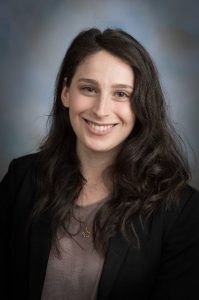 Marisa Rosen (5th year) completed her empirical comp, “In this economy? Voice behaviors and silence under economic crisis.” The main purpose of the project was to uncover how the economic crisis influenced job insecurity and the subsequent willingness to speak up, with the expectation that employees would feel more job insecure during the COVID-19 induced economic crisis and be less willing to speak up for fear of losing their jobs. Some qualitative results demonstrated this relationship may exist and warrants future investigation. The availability of resources and stressors predicted well-being and stress, as did silence about organizational issues. Results demonstrate the importance of empowering employees to speak up for their well-being and organizational functioning. She proposed her dissertation, “Understanding Voice Behaviors and Silence Among Racial Groups” and aims to complete the project during Summer 2022. Her dissertation will examine using longitudinal methods if a diversity climate serves as a resource, particularly for racial and ethnic minorities, that promotes speaking up and reduces burn-out.
Marisa Rosen (5th year) completed her empirical comp, “In this economy? Voice behaviors and silence under economic crisis.” The main purpose of the project was to uncover how the economic crisis influenced job insecurity and the subsequent willingness to speak up, with the expectation that employees would feel more job insecure during the COVID-19 induced economic crisis and be less willing to speak up for fear of losing their jobs. Some qualitative results demonstrated this relationship may exist and warrants future investigation. The availability of resources and stressors predicted well-being and stress, as did silence about organizational issues. Results demonstrate the importance of empowering employees to speak up for their well-being and organizational functioning. She proposed her dissertation, “Understanding Voice Behaviors and Silence Among Racial Groups” and aims to complete the project during Summer 2022. Her dissertation will examine using longitudinal methods if a diversity climate serves as a resource, particularly for racial and ethnic minorities, that promotes speaking up and reduces burn-out.
 Chloe Goldman (3rd year) defended her thesis,
Chloe Goldman (3rd year) defended her thesis,
“Don’t Take That Tone with Me! An Examination of Attribution and Evaluation as a Consequence of Incivility Perceived in Workplace Email.” Findings from this email vignette-based study suggest that when people perceive incivility in workplace email they make assumptions about the characteristics of the email sender’s disposition and capabilities.
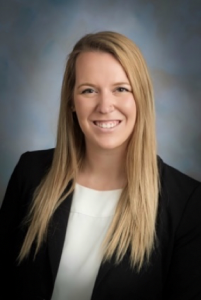 Becca Clancy (5th year) de-fended her empirical comp, titled “Failed organizational change efforts from the perspective of change agents: A qualitative analysis” and plans to propose her dissertation before the end of spring 2022. Her dissertation includes two manuscripts examining leadership support for employee health, well-being, and safety using multi-level organizational data collected from a project Becca worked on with an agribusiness in Central America. These manuscripts are titled “Do you have my back? Investigating the includes of employee perceptions of leadership support for health and well-being” and “What matters most? Differentials effects of leadership support on employee health and safety”
Becca Clancy (5th year) de-fended her empirical comp, titled “Failed organizational change efforts from the perspective of change agents: A qualitative analysis” and plans to propose her dissertation before the end of spring 2022. Her dissertation includes two manuscripts examining leadership support for employee health, well-being, and safety using multi-level organizational data collected from a project Becca worked on with an agribusiness in Central America. These manuscripts are titled “Do you have my back? Investigating the includes of employee perceptions of leadership support for health and well-being” and “What matters most? Differentials effects of leadership support on employee health and safety”
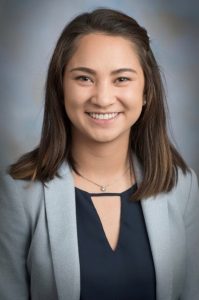 Jacqueline Wong (5th year) finished her empirical comp, titled “Work, home, and health outcomes of the com-pressed workweek and organizational support moderators.” This study evaluated access to a compressed workweek (CWW) schedule and use of the CWW as two unique predictors, tested well-being outcomes of the CWW (i.e., physical health, emotional health, satisfaction with work-nonwork balance, engagement), and included organizational sup-port variables (i.e., supervisor support for non-work, supervisor support for flexibility, team flexibility, and perceptions of climate for work priority) as moderators. Neither CWW access nor CWW use were positively associated with any of the four outcomes, and some moderation hypotheses were supported, although the relationships were generally nonsignificant at all levels of the moderators. Thus, this study provides little evidence for the benefits of the CWW. Flexible work arrangements can provide benefits to workers, but organizations and scholars should continue to consider the specific type of flexibility as well as the context with-in which that flexibility occurs, including how it is implemented and other resources or policies that can foster the greatest impact of flexibility on positive individual, team, and organizational outcomes. She is currently working on dissertation, which will be a qualitative study focused on people who changed career trajectories during the COVID-19 pandemic, the extent to which meaningful work and existentialism played a role in their decision-making, and how they are currently thinking about their work-related identities and values.
Jacqueline Wong (5th year) finished her empirical comp, titled “Work, home, and health outcomes of the com-pressed workweek and organizational support moderators.” This study evaluated access to a compressed workweek (CWW) schedule and use of the CWW as two unique predictors, tested well-being outcomes of the CWW (i.e., physical health, emotional health, satisfaction with work-nonwork balance, engagement), and included organizational sup-port variables (i.e., supervisor support for non-work, supervisor support for flexibility, team flexibility, and perceptions of climate for work priority) as moderators. Neither CWW access nor CWW use were positively associated with any of the four outcomes, and some moderation hypotheses were supported, although the relationships were generally nonsignificant at all levels of the moderators. Thus, this study provides little evidence for the benefits of the CWW. Flexible work arrangements can provide benefits to workers, but organizations and scholars should continue to consider the specific type of flexibility as well as the context with-in which that flexibility occurs, including how it is implemented and other resources or policies that can foster the greatest impact of flexibility on positive individual, team, and organizational outcomes. She is currently working on dissertation, which will be a qualitative study focused on people who changed career trajectories during the COVID-19 pandemic, the extent to which meaningful work and existentialism played a role in their decision-making, and how they are currently thinking about their work-related identities and values.
Transition from Paid Work to Unpaid Activities-
Jan Cleveland, Professor Emeritus, CSU
Although Jan’s formal CSU ‘retirement’ was in May 2021, she continues to work with a few graduate students to complete their degree requirements. She is still in transition from paid work to unpaid activities and has been surprised by how much paperwork this involves.
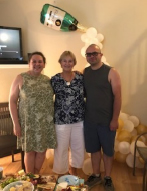 Jan has been keeping herself busy with plenty of new projects, including home renovations and planning her daughter’s wedding. Although the renovations have had no shortage of frustrations and will take longer than expected, Jan says the planning and outcomes have been so much fun, and she also met some wonderful folks in the process. Planning the wed-ding has filled a good amount of Jan’s time since November 2021, but has been putting her skills acquired from her roles as Chair of both the Human Resources and Gender and Diversity in Organization Divisions of Academy of Management to good use: organizing and tracking vendors, keeping within budget, and securing a venue, catering, and entertainment. She has enjoyed working with her daughter and future son-in-law in a different way, and is so excited for the wedding in May.
Jan has been keeping herself busy with plenty of new projects, including home renovations and planning her daughter’s wedding. Although the renovations have had no shortage of frustrations and will take longer than expected, Jan says the planning and outcomes have been so much fun, and she also met some wonderful folks in the process. Planning the wed-ding has filled a good amount of Jan’s time since November 2021, but has been putting her skills acquired from her roles as Chair of both the Human Resources and Gender and Diversity in Organization Divisions of Academy of Management to good use: organizing and tracking vendors, keeping within budget, and securing a venue, catering, and entertainment. She has enjoyed working with her daughter and future son-in-law in a different way, and is so excited for the wedding in May.
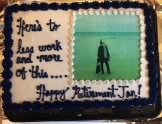 Jan and Kevin have been missing traveling internationally over the past two
Jan and Kevin have been missing traveling internationally over the past two
years, but have made plenty of national trips since her retirement—a sister trip to Napa Valley, Vegas, Seattle, multiple trips to Albany, NY to visit Kevin’s family and close friends, and multiple trips to Jan’s hometown in Long Beach/Seal Beach, CA to connect with family and high school friends. Jan and Kevin plan to continue their travels within the U.S., but are extremely excited for an upcoming trip to Vienna, Austria this fall (COVID permitting).
Jan continues to connect with I/O psychology as a co-editor of the Applied Psychology Series with Donald Truxillo at the University of Limerick (formerly at Portland State U). She is really looking forward to physically attending SIOP conferences again. Other than this, Jan is happily transitioning to other hobbies, interests, and new experiences in her unpaid work status. She loves having fewer time demands and a slightly more open schedule, and has recently rejoined a gym, worked with a personal trainer, and even picked up a basketball to shoot a few hoops. Jan and Kevin have missed I/O faculty/student gatherings at their house and are hopeful that the warmer weather will provide some more opportunities for them to host us once again.
Welcome to the CSU Family, Ada Jo!
 Josh Prasad’s second child, Ada Jo Prasad, was born November 8th, 2021. She likes to prevent her parents from sleeping, but she makes up for it with how cute and social she is! Life with a newborn and a toddler is a challenge, but the kids bring Josh and his wife a lot of joy, and they are thankful to have a lot of support.
Josh Prasad’s second child, Ada Jo Prasad, was born November 8th, 2021. She likes to prevent her parents from sleeping, but she makes up for it with how cute and social she is! Life with a newborn and a toddler is a challenge, but the kids bring Josh and his wife a lot of joy, and they are thankful to have a lot of support.
Josh is on parental leave for Spring 2022, but he has certainly been keeping himself busy. He continues to support his students while also working on a collection of papers applying machine learning to topics in I/O psychology. Outside of work, Josh just bought his first ever pair of downhills skis. However, If you are ever looking for him on the mountain, he says he will be sticking to the greens or slopeslide bar.
